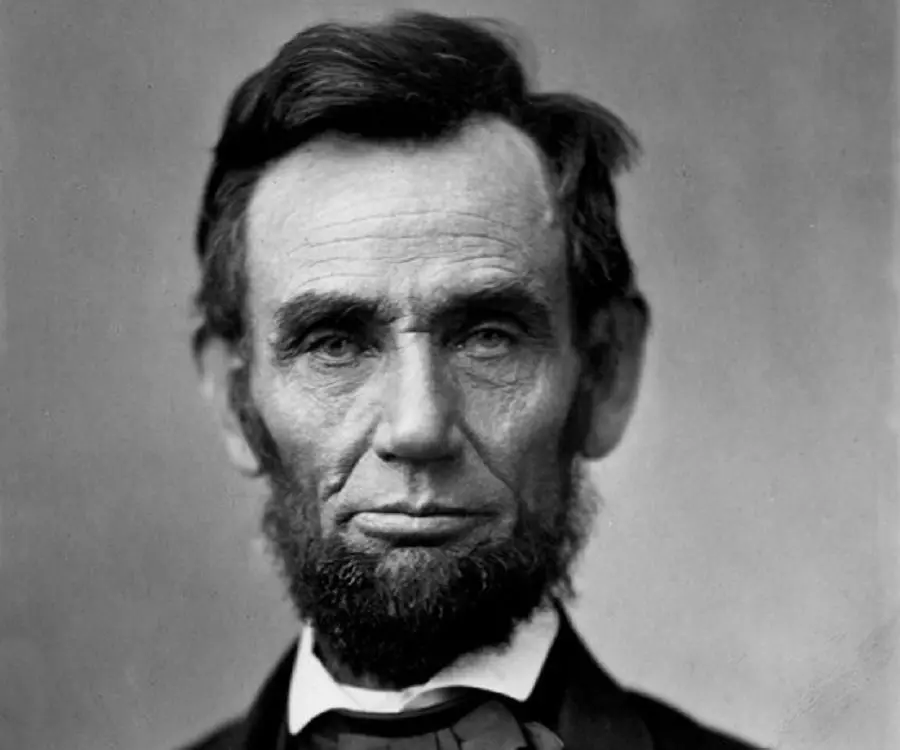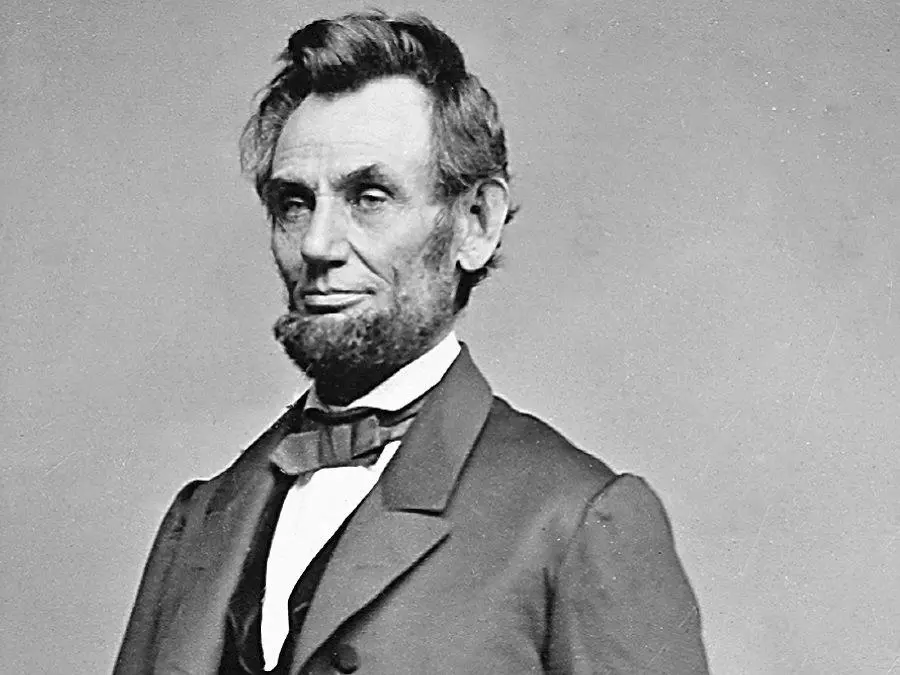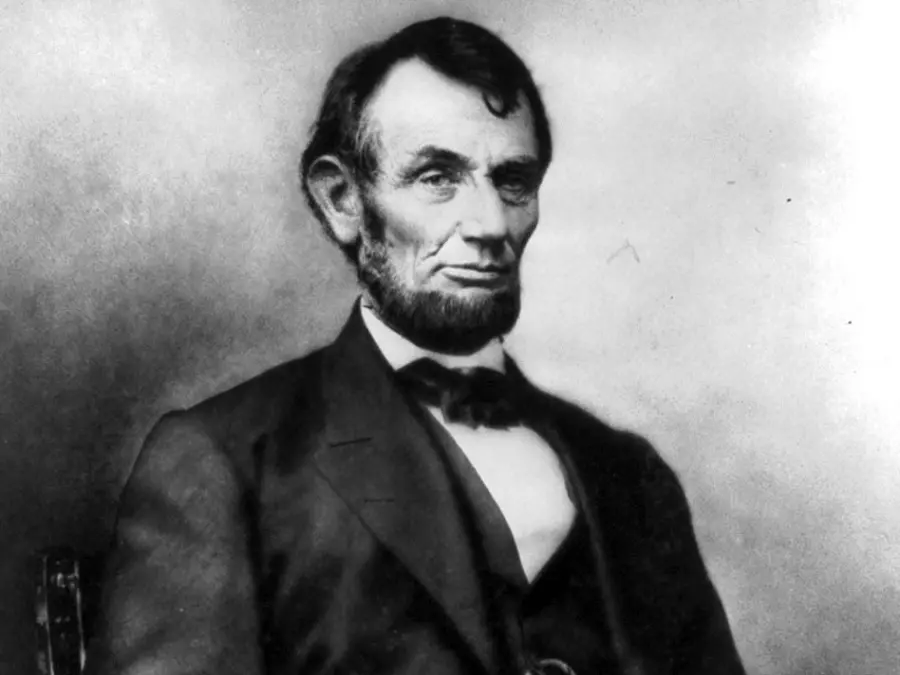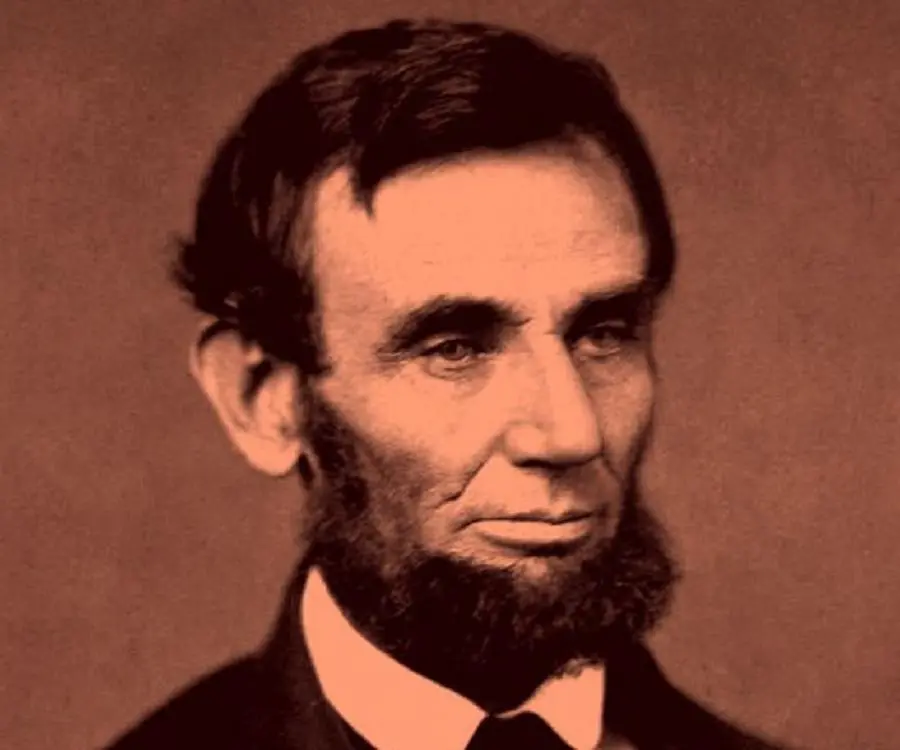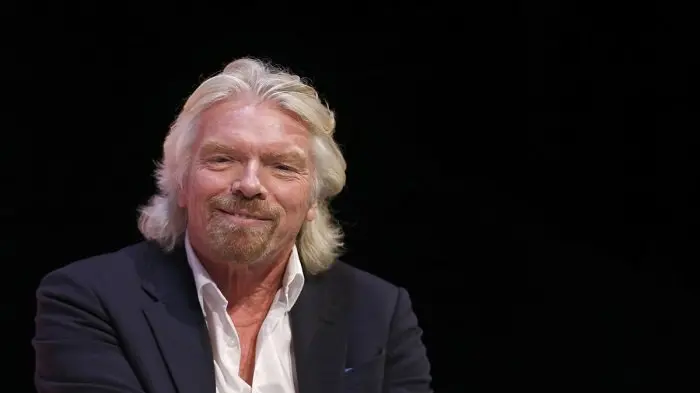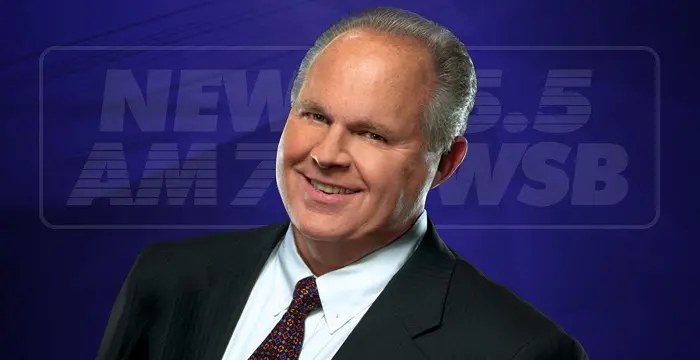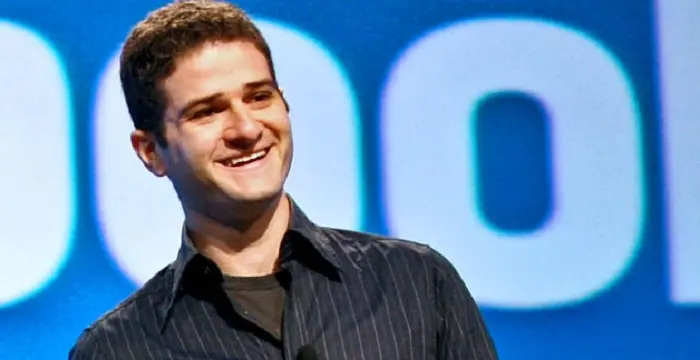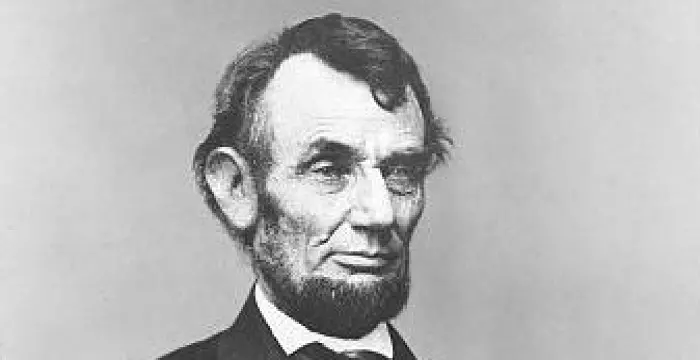
Abraham Lincoln - Presidents, Life Achievements and Childhood
Abraham Lincoln's Personal Details
Abraham Lincoln was the sixteenth President of the United States
| Information | Detail |
|---|---|
| Birthday | February 12, 1809 |
| Died on | April 15, 1865 |
| Nationality | American |
| Famous | Poorly Educated, Republicans, Leaders, Political Leaders, Presidents, INTP, Presidents |
| Ideologies | Republicans |
| City/State | Kentucky |
| Spouses | Mary Todd |
| Siblings | Sarah Lincoln Grigsby, Thomas |
| Childrens | Robert Todd Lincoln |
| Cause of death |
|
| Birth Place | Hodgenville, Kentucky, U.S. |
| Political Ideology | Republican (1854–1865), National Union (1864–1865) |
| Diseases Disabilities | Depression |
| Gender | Male |
| Father | Thomas Lincoln |
| Mother | Nancy Lincoln |
| Sun Sign | Aquarius |
| Born in | Hodgenville, Kentucky, U.S. |
| Famous as | American President. |
| Died at Age | 56 |
Abraham Lincoln's photo
Who is Abraham Lincoln?
Turn the pages of America’s political history, and you are sure to find one man who clearly outshines all others and manages to attract the attention and interest of all, till date, - Abraham Lincoln! Nicknamed ‘Honest Abe’ or ‘Father Abraham’, Lincoln was, by far, one of the most powerful and greatest Presidents’ that America has ever witnessed. Rising from a modest and humble beginning, it was his sheer determination and honest effort that led him to the nation’s highest office. An astute politician and proficient lawyer, he played a vital role in unification of the states and led from the front for the cause of abolishing slavery from the country, eventually giving people equal rights, irrespective of caste, color or creed. He not only envisioned but actually brought to the forefront a truly democratic government which was led by the concept of ‘by the people, of the people and for the people’. What’s more, Lincoln led the country when it faced its greatest constitutional, military and moral crises. He not only turned up victorious but also was effective in strengthening the national government and modernizing the economy. He was a saviour of the Union and an emancipator for the slaves. However, just as astonishing was his rise to the top-notch position and his eventual governance, his death was equally bewildering as he became the first U.S President ever to be assassinated. Though in his life Abraham Lincoln has been felicitated with no awards and honors, as there did not exist any awards then, he has till date retained a spot in the Top Three Presidents since 1940s. As for the presidential ranking polls conducted since 1948, Lincoln has been rated at the very top in the majority of polls.
// Famous Leaders
Edi Rama
Edi Rama is the current Prime Minister of Albania. Check out this biography to know about his childhood, life, achievements, works & timeline.
Tecumseh
Tecumseh was a Native American leader of the Shawnee clan. This biography profiles his childhood, life and timeline.
Khalifa bin Zayed Al Nahyan
Sheikh Khalifa bin Zayed Al Nahyan is the current President of the United Arab Emirates (UAE). Check out this biography to know about his birthday, childhood, family life, achievements and fun facts about him.
Childhood & Early Life
Born to Thomas Lincoln and Nancy Lincoln, in a log-cabin in Hardin County Kentucky, Abraham Lincoln was the second of the three children of the couple. He had an elder sister Sarah and a younger brother Thomas who died in infancy.
Senior Lincoln was a hardworking man. Through his relentless efforts, he became one the richest men in the country. He was respected and honoured by one and all. However, the blissfulness did not last long as Thomas Lincoln lost all what he had, which led to the family shifting base to the present Spencer County, Indiana.
Religiously, the Lincolns attended Separate Baptists church and had opposing views regarding alcohol, dancing and slavery. They completely believed in restrictive moral standards.
In 1818, tragedy struck the family as Nancy Lincoln left for the heavenly abode, after suffering from milk sickness. The death of his mother had devastating effect on young Lincoln who grew alienated from his father. However, the gap was abridged by his stepmother, Sarah Bush Johnston whom he grew close to.
Billed as lazy and indolent by most due to his dislike for the hard labor associated with frontier life, Lincoln wronged all as he grew up to be responsible and dedicated. He completed all the chores expected of a boy from a household and became an adept axe-man in his work, building rail fences. He also dutifully submitted all his earning to his father.
As far as his education is concerned, Lincoln made extraordinary efforts to attain knowledge. Though both his parents were illiterate and unschooled, they encouraged Lincoln to read and write, especially his stepmom Sarah. It is estimated that all through his life Lincoln did not have not more than 18 months of formal education.
Since there was not much scope of formal education in the Indiana wilderness, he walked for miles at stretch to borrow a book. He was an avid reader and had read all the then popular books several times, including the Bible. Thus, the knowledge and wisdom that Lincoln possessed was mostly self-taught.
The family shifted base to Coles County, Illinois in 1831, after fearing milk sickness. At the age of 22, Lincoln set off on his own. His first stop was in a village of New Salem in Sangamon County, where he took up a job of transferring goods by flatboat from New Salem to New Orleans via the Sangamon, Illinois, and Mississippi rivers
Abraham Lincolns mother, Nancy Hanks Lincoln, died of milk disease on October 5, 1818. She was buried in a grave which was located just behind the family cabin.
Formative Years
In 1832, Lincoln shifted to New Orleans, where, along with a friend, he bought a small general store. However, since the venture did not turn out to be profitable, he sold his shares and instead, tried his hand at politics. He started campaigning for a seat at the Illinois General Assembly.
Though Lincoln had gained popularity through his skilled storytelling ability, his lack of proper formal education, money and powerful friends lead to his loss. Meanwhile, while taking part in the assembly, Lincoln also served in the Black Hawk War as a captain in the Illinois Militia.
After working as a postmaster and county surveyor, Lincoln’s gave in to his wish to become a lawyer. He started reading law books to equip himself with the knowledge required in the field. Lincoln’s social skills and antics at story-telling were honed during this phase of life.
In 1834, his second campaign turned out to be successful as he won election to the state legislature and ran as a Whig.
In 1836, Lincoln moved to Springfield Illinois where he enrolled himself to the bar and started practicing law under John T. Stuart.
Lincoln’s reputation as an able and efficient lawyer grew up leaps and bounds. He began known for his tough and challenging cross-examinations and closing arguments. Over the years, Lincoln worked with a number of professional lawyers including Stephen T. Logan and William Herndon.
Lincoln’s political career was progressing steadily as well. In his four years of successive term at the Illinois House of Representatives as a Whig representative, he was known for voicing against the perils of slavery and abolitionism. He regularly spoke for economic modernization in various sectors including banking.
Rising popularity and great work earned Lincoln a seat at the U.S. House of Representative in 1846, where he served a two-year term. A true Whig supporter, he stood for his party beliefs and participated in all votes. He even made speeches that stressed on abolition of slavery in the District of Columbia.
As far as foreign and military policies are concerned, Lincoln was heavily against Mexican-American War and President Polk and instead supported the Wilmot Proviso. His stand against the President earned him negative publicity as Lincoln lost political support from not only his district, but even earned the nickname ‘spotty Lincoln’.
In the 1848 presidential elections, Lincoln changed his preference as he shifted to the General Zachary Taylor camp for the Whig nomination. Though Taylor won the elections, Lincoln lost to Justin Butterfield for the office of the Commissioner of the General Land Office. Instead, he was offered a position of a secretary or governor of the Oregon Territory. He refused the same to resume his law practice.
Lincoln’s career as a lawyer was steadily growing as was his reputation and status. He even appeared before the Supreme Court of the United States. Out of his 175 appearances at the Illinois Supreme Court, 51 times he stood as a sole counsellor out of which he won on 31 occasions. His client list included big names from the country.
Work on Anti-Slavery
While the northern states of US had banned slavery and were against suppression of people belonging to the lower class or caste, the southern states and the newer territories in the West still did not think of same as morally unethical. As such, to cast a similar influence, Lincoln switched back to his political career by the 1850s and strongly opposed the Kansas-Nebraska Act.
According to the Act, Douglas had permitted the settlers to determine whether or not they wanted to allow slavery in the new territory. He even argued that the national Congress had no role to play in the matter that he adjudged as only locally important.
Lincoln’s stand against slavery was prominently visible in his ‘Peoria speech’ which he gave on October 16, 1854. According to it, he strongly hated slavery due to the monstrous injustice that it represented and also the deprival of equality of rights among men.
Lincoln ran for the seat at the US Senate from Illinois in 1854. Though he was comfortably leading ahead of others in the first six rounds, it was his strong opposition for the Kansas–Nebraska Act that lead to his downfall as there was a split amongst the Whigs.
It was his take on anti-slavery along with an appeal for ‘Free Soil’, ‘Liberty’ that shaped the new Republican Party. At the 1856 Republican National Convention, Lincoln was second in the contest to become the party's candidate for vice president.
In 1858, Lincoln won the state Republic party’s vote which nominated him for the U.S Senate. With this started the series of Lincoln-Douglas debates, which have earned the reputation of being the most popular debates in American history.
Lincoln and Douglas were tangent apart from each other in terms of their political outlook and physical appearance. While Lincoln professed the seizure of slavery, Douglas promoted his ‘Freeport Doctrine’ according to which local people of a state were free to decide whether or not slavery should be practiced in their state.
Lincoln’s Republican Party won great many votes, but the Democratic Party bagged a number of seats thus re-electing Douglas to the Senate. Despite the loss, Lincoln was committed towards eradicating slavery from the nation and insisted that the moral foundation of Republic required opposition to slavery.
Campaign for Presidency
In 1860, a campaign was organized by the political operatives in Illinois which ran in support of Lincoln for the presidency. Interestingly, he surpassed well known candidates such as William Seward of New York and Salmon P. Chase of Ohio at the Republican National Convention in Chicago.
It was Lincoln’s moderate take on slavery, his support for national infrastructure and the protective tariff which won him the nomination and the subsequent popularity. He beat Southern Democrat Douglas, John C. Breckinridge of the Northern Democrats and John Bell of the Constitution Party to pave his way to the most coveted political position, garnering a total of 180 electoral votes of the 303.
Eventually, on November 6, 1860, Lincoln was elected as the 16th President of the United States.
On March 4, 1861, he assumed the office and became the first ever President from the Republican Party. He selected a strong cabinet, which consisted of many of his political rivals such as William Seward, Salmon P. Chase, Edward Bates and Edwin Stanton.
Tenure as a President - Succession & Civil War
Lincoln’s succession into the White House was mostly due to his attaining maximum support from North and West. However, the South was enraged about the result and decided to withdraw itself from the Union and form a separate nation by the name, Confederate States of America.
The states included in the Confederate States of America were South Carolina, Florida, Mississippi, Alabama, Georgia, Louisiana, and Texas. Led by Jefferson Davis, these states considered themselves as independent and sovereign.
Lincoln, however, in his inaugural address in March the following year refused to recognize the Confederacy, declaring secession illegal. Though there were attempt to come to a compromise and settlement, Lincoln admonished all such offers and stood by his stand for free-soil and slave-free states.
As much as Lincoln hated war, he had to live with the same as secessionists were enraged by Lincoln’s orders and instead announced war. What turned worse was that other southern states like North Carolina, Virginia, Tennessee, and Arkansas also joined the Confederate. They took hold of the Fort Sumter and with this started what is termed as America’s costliest and most deadly conflict.
Lincoln appointed troops to head towards Washington and protect the capital. He withdrew $2 million from the Treasury for war material, called for 75,000 volunteers into military service and suspended the writ of habeas corpus, eventually arresting and imprisoning suspected Confederate sympathizers without a warrant. He also developed strong ties with the border slave states and worked towards keeping the war from being an international conflict.
Lincoln met dead end at all sides. Crushing the opponent seemed difficult and losing to them impossible. As for his stand, while the Copperheads felt that Lincoln was too stubborn on his stand for anti-slavery, Radical Republicans criticized him for moving slowly in abolishing slavery. To add to the woes, Lincoln faced defiance and vilification from generals, his Cabinet, his party, and a majority of the American people.
Lincoln kept a close eye on the progress of the war and was aware of every minute detailing. He regularly consulted with the governors, selected generals and checked military effort. His main priorities with the war were based on two things – Washington should be well defended and an aggressive war should be conducted that would satisfy the demand in the North for prompt, decisive victory.
General McClellan was appointed as the general-in-chief of all the Union armies. Though the first year and a half was difficult due to the defeats and dropping morale and support for re-unification of the nation, the victory at the Antietam gave Lincoln some sort of relief and the idea to reshape the war from ‘uniting the nation’ to ‘abolishing slavery’.
Meanwhile, midterm elections in 1862 brought bad news for the Lincoln-led government as the public had questioned the ability of the administration and its failure to bring a speedy end to the war. Other factors that acted otherwise for the government was rising inflation, new high taxes, rumors of corruption, suspension of habeas corpus, the military draft law, and fears that freed slaves would undermine the labor market.
As for the war, Lincoln had understood that the end of the war could be near if a string of victories was put together. They were able to register success at the Charleston harbour and the Battle of Gettsyburg.
Emancipation Proclamation
Lincoln’s idea for a slave-free nation was not just undermined by the South but by the Constitution as well, which committed the issue to individual states. As such, efforts taken by the Federal government alone could not resolve the issue.
To put an end to slavery, Lincoln offered the states compensated emancipation in return for their prohibition of slavery. He believed that this method would help curtail slavery from within the roots.
Thus, the Second Confiscation Act was passed on July 1862 according to which the slaves were guaranteed freedom. The main purpose behind this act was to weaken the rebellious war that the opponents had raised. Though Congress was not successful in permanently dissolving slavery, it did show Congress’ support for liberating slaves owned by slave owners.
Same time, Lincoln came with the first draft of the Emancipation Proclamation according to which he stated that all persons held as slaves in the Confederate states will be free and liberated.
The Emancipation Proclamation was official issued on September 22, 1862 and came into practice since January 1, 1863. It declared the slaves in the 10 states not present in the Union as free.
The next few months were spent preparing the army and the country for emancipation.
Abolition of slavery became a military objective and to fulfil the same, the Union armies proved tough. The more they advanced towards South, the more slaves were being free and liberated and thus, the objective was nearing accomplishment. In a short time, all the slaves, the number counting up to three million were freed from Confederate territory.
Once free, the slaves were absorbed by the military as more and more black recruitments seemed to occur. This was the original policy that the government promised to act upon after the issuance of Emancipation Proclamation.
In 1863, Lincoln and the rest of the Republican and other supporters attained partial victory. Emancipation of slaves had become a national war effort and a democratic government which was of the people, by the people and for the people had evolved. Lincoln commented that the war was an effort to bring in liberty and equality for all.
Re-Election & Re-Construction
With America’s most deadly conflict, the Civil War, and the unstable economic conditions, Lincoln’s re-election as a President seemed to be doubtful and uncertain. Nevertheless, a master politician that he was, he worked hard to build the strength of the party, fetched support for his policy and fend efforts by Radicals to drop him in the 1864 elections.
What resulted was a magnanimous win of Lincoln, where he gained support from all states, excepting three, and receiving almost 78% of the Union soldier’s vote. He had managed to bag 212 out of the 233 electoral votes. On March 4, 1865, Lincoln was official sworn in as the President and gave his second inaugural address.
Post the re-election, Lincoln made reintegration of the Southern states and re-unification of the nation as the number one agenda on his list of to-dos. The administration of the Southern states was re-formed.
While Tennessee was under the guidance of General Andrew Johnson, General Frederick Steele was the military governor for Arkanas. General Nathaniel P. Banks upheld the plans of restoring the statehood in Louisiana.
Radical Republican, Salmon P. Chase filled up the chair of the Chief Justice in the Supreme Court. He was chosen, as Lincoln believed that he would uphold the emancipation which until then was applicable to selected states.
Lincoln increased pressure on the Congress to abolish slavery for good throughout the nation and not in certain states only with the help of a constitutional amendment.
The proposed constitutional amendment that would pave way for the exit door for slavery was brought before Congress but failed to pass in its first attempt. Later, it became part of the Republican/Unionist platform and eventually was passed in the second meeting. The passed bill was next sent to the state legislatures for ratification, with it becoming the Thirteenth Amendment to the United States Constitution on December 6, 1865.
The surrender of Lee at the Appomattox Court House in Virginia, in April 1865, official brought an end to the Civil War. His surrender brought forth the surrender of several other rebel armies and leaders.
The unification of the states eventually led to the consequence for the name of the country ‘United States’. Though the Civil War was the most implacable of the conflicts in America, it did led to the dominance of a singular name, United States for the country by large.
Lincoln was largely responsible for harbouring the sails of the American political system towards republicanism. At a time when the world focussed on the sanctity of the constitution, Lincoln believed that majority rule had to be restrained with the constitutional checks and limitations.
Other than this, Lincoln during his term of presidency vetoed four bills, the most important one being the Wade-Davis Bill with its harsh program of Reconstruction which the Radicals had passed. He also was behind the creation of the first U.S. income tax on incomes greater than $800. He was also responsible for the creation of system of national banks by the National Banking Act.
His Assassination
John Wilkes Booth, the assassinator of Lincoln, had contact with the Confederate secret service. It is believed that Booth initially planned to abduct Lincoln in exchange for the release of Confederate prisoners. However, enraged by Lincolns speech of giving blacks voting rights and thus equal status in the society, Booth resolved to assassinate him.
The tragic incident occurred during the screening of the play, Our American Cousin at the Ford theatre, which Lincoln went to watch along with First Lady, Henry Rathbone and Clara Harris. His main bodyguard, Ward Hill Lamon was not present and John Parker took to the temporary vacant position.
Joining the driver for drinks at the interval, Parker left Lincoln unguarded, a setting which Booth capitalized on. He shot Lincoln at point-blank range on his head mortally wounding him. He then stabbed Major Henry Rathbone and escaped.
Although Lincoln was provided medical help by an Army surgeon, Doctor Charles Leale, who was sitting nearby at the theatre, lack of breath and dropping pulse rate worsened the condition. Lincoln was taken to Peterson House, where he was in coma for nine hours before succumbing to death on April 15, 1865.
Meanwhile, Booth was tracked down 10 days later on a farm in Virginia, some 70 miles south of Washington, D.C. He put up a brief fight, finally losing out to Sergeant Boston Corbett who killed him.
Lincoln’s body was wrapped in the flag and escorted to the White House by Union officers. His coffin was first laid in the East Room and later in the Capitol Rotunda from April 19 through April 21.
He made his final journey alongside his son in the executive coach for three weeks from the White House to Springfield, Illinois, stopping at various cities across the North for large-scale memorials. People gathered in huge numbers paid their tributes to the great politician ever, through bands, bonfires, hymn singing or silent reverence.
Lincoln was interred in the Oak Ridge Cemetery in Springfield, Illinois, U.S. His tomb is called the Lincoln's Tomb. Posthumously, Lincoln was honoured by the United States and a memorial was constructed in Washington D. C with the name Lincoln Memorial. It is by far the most famous and visited memorials.
Personal Life & Legacy
Lincoln’s first love was Ann Rutledge, whom he had met while relocating to New Orleans. The two shared a cordial relationship which ended abruptly following her death on August 25, 1835 from typhoid and fever.
He was involved with Mary Owens from Kentucky. Their relationship was blissful and cordial but until a time after which the two separated, as both had developed second thoughts about their relationship.
Lincoln met Mary Todd in December 1839. Hailing from a wealthy slave-holding family in Lexington, Kentucky, the two shared a great chemistry which led to their engagement the following year. However, Lincoln broke off the engagement only to marry her a year later on November 4, 1842.
The couple was blessed with four children, all sons. However, barring Robert Todd Lincoln, the eldest, none of the children survived till adulthood. As parents, the Lincoln couple were noted for their lenient attitude. They were extremely fond of children and the death of the little ones caused a strong impact on their personal lives.
In Lincoln's memory, Lincoln’s sculpture was unveiled at Mount Rushmore. Ford Theatre and Peterson House in Washington and the Abraham Lincoln Presidential Library and Museum, located in Springfield, Illinois are other memorials dedicated to this proficient politician.
To honor him, Lincoln’s portrait appears on two denominations of United States currency, penny and $5 bill. What’s more, there are many postage stamps that bear his likeness.
Trivia
He was the first President to be born out of the thirteen states. Additionally, he was the first president born in Kentucky and the first to wear a beard.
He was the first US President to be assassinated.
He is the only president to have a patent to his name. The patent was for a device which assisted in freeing the ships that would get aground in shallow waters.
Interestingly, unlike other presidents’, he would keep all his important papers, mail, bankbook and so on in his stovepipe hat. Probably, this is the reason why it was called his ‘desk and memorandum book’ and sometimes his ‘filing cabinet’.
He is responsible for the institution of Thanksgiving Day in United States of America. Until then, the day was celebrated sporadically and on irregular dates. He declared the final Thursday in the month of November as Thanksgiving Day.
A man with outstanding capability, he earned quite a few nicknames in his life, some of which are ‘Honest Abe’, ‘The Rail Splitter’, ‘The Great Emancipator’, and ‘Father Abraham’.
// Famous Political Leaders
Edi Rama
Edi Rama is the current Prime Minister of Albania. Check out this biography to know about his childhood, life, achievements, works & timeline.
Khalifa bin Zayed Al Nahyan
Sheikh Khalifa bin Zayed Al Nahyan is the current President of the United Arab Emirates (UAE). Check out this biography to know about his birthday, childhood, family life, achievements and fun facts about him.
Leo Varadkar
Cam Leo Varadkar is the current Taoiseach—the Prime Minister—of the Republic of Ireland. Check out this biography to know about his childhood, family life, achievements and other facts about his life.
Abraham Lincoln biography timelines
- // 12th Feb 1809Born to Thomas Lincoln and Nancy Lincoln, in a log-cabin in Hardin County Kentucky, Abraham Lincoln was the second of the three children of the couple. He had an elder sister Sarah and a younger brother Thomas who died in infancy.
- // 1818In 1818, tragedy struck the family as Nancy Lincoln left for the heavenly abode, after suffering from milk sickness. The death of his mother had devastating effect on young Lincoln who grew alienated from his father. However, the gap was abridged by his stepmother, Sarah Bush Johnston whom he grew close to.
- // 5th Oct 1818Abraham Lincolns mother, Nancy Hanks Lincoln, died of milk disease on October 5, 1818. She was buried in a grave which was located just behind the family cabin.
- // 1831The family shifted base to Coles County, Illinois in 1831, after fearing milk sickness. At the age of 22, Lincoln set off on his own. His first stop was in a village of New Salem in Sangamon County, where he took up a job of transferring goods by flatboat from New Salem to New Orleans via the Sangamon, Illinois, and Mississippi rivers
- // 1832In 1832, Lincoln shifted to New Orleans, where, along with a friend, he bought a small general store. However, since the venture did not turn out to be profitable, he sold his shares and instead, tried his hand at politics. He started campaigning for a seat at the Illinois General Assembly.
- // 1832Though Lincoln had gained popularity through his skilled storytelling ability, his lack of proper formal education, money and powerful friends lead to his loss. Meanwhile, while taking part in the assembly, Lincoln also served in the Black Hawk War as a captain in the Illinois Militia.
- // 1834In 1834, his second campaign turned out to be successful as he won election to the state legislature and ran as a Whig.
- // 1836In 1836, Lincoln moved to Springfield Illinois where he enrolled himself to the bar and started practicing law under John T. Stuart.
- // 4th Nov 1842Lincoln met Mary Todd in December 1839. Hailing from a wealthy slave-holding family in Lexington, Kentucky, the two shared a great chemistry which led to their engagement the following year. However, Lincoln broke off the engagement only to marry her a year later on November 4, 1842.
- // 1846Rising popularity and great work earned Lincoln a seat at the U.S. House of Representative in 1846, where he served a two-year term. A true Whig supporter, he stood for his party beliefs and participated in all votes. He even made speeches that stressed on abolition of slavery in the District of Columbia.
- // 1848In the 1848 presidential elections, Lincoln changed his preference as he shifted to the General Zachary Taylor camp for the Whig nomination. Though Taylor won the elections, Lincoln lost to Justin Butterfield for the office of the Commissioner of the General Land Office. Instead, he was offered a position of a secretary or governor of the Oregon Territory. He refused the same to resume his law practice.
- // 1854Lincoln’s stand against slavery was prominently visible in his ‘Peoria speech’ which he gave on October 16, 1854. According to it, he strongly hated slavery due to the monstrous injustice that it represented and also the deprival of equality of rights among men.
- // 1854Lincoln ran for the seat at the US Senate from Illinois in 1854. Though he was comfortably leading ahead of others in the first six rounds, it was his strong opposition for the Kansas–Nebraska Act that lead to his downfall as there was a split amongst the Whigs.
- // 1856It was his take on anti-slavery along with an appeal for ‘Free Soil’, ‘Liberty’ that shaped the new Republican Party. At the 1856 Republican National Convention, Lincoln was second in the contest to become the party's candidate for vice president.
- // 1858In 1858, Lincoln won the state Republic party’s vote which nominated him for the U.S Senate. With this started the series of Lincoln-Douglas debates, which have earned the reputation of being the most popular debates in American history.
- // 6th Nov 1860Eventually, on November 6, 1860, Lincoln was elected as the 16th President of the United States.
- // 4th Mar 1861On March 4, 1861, he assumed the office and became the first ever President from the Republican Party. He selected a strong cabinet, which consisted of many of his political rivals such as William Seward, Salmon P. Chase, Edward Bates and Edwin Stanton.
- // 1862Meanwhile, midterm elections in 1862 brought bad news for the Lincoln-led government as the public had questioned the ability of the administration and its failure to bring a speedy end to the war. Other factors that acted otherwise for the government was rising inflation, new high taxes, rumors of corruption, suspension of habeas corpus, the military draft law, and fears that freed slaves would undermine the labor market.
- // 1862Thus, the Second Confiscation Act was passed on July 1862 according to which the slaves were guaranteed freedom. The main purpose behind this act was to weaken the rebellious war that the opponents had raised. Though Congress was not successful in permanently dissolving slavery, it did show Congress’ support for liberating slaves owned by slave owners.
- // 1863In 1863, Lincoln and the rest of the Republican and other supporters attained partial victory. Emancipation of slaves had become a national war effort and a democratic government which was of the people, by the people and for the people had evolved. Lincoln commented that the war was an effort to bring in liberty and equality for all.
- // 1st Jan 1863The Emancipation Proclamation was official issued on September 22, 1862 and came into practice since January 1, 1863. It declared the slaves in the 10 states not present in the Union as free.
- // 1864With America’s most deadly conflict, the Civil War, and the unstable economic conditions, Lincoln’s re-election as a President seemed to be doubtful and uncertain. Nevertheless, a master politician that he was, he worked hard to build the strength of the party, fetched support for his policy and fend efforts by Radicals to drop him in the 1864 elections.
- // 4th Mar 1865What resulted was a magnanimous win of Lincoln, where he gained support from all states, excepting three, and receiving almost 78% of the Union soldier’s vote. He had managed to bag 212 out of the 233 electoral votes. On March 4, 1865, Lincoln was official sworn in as the President and gave his second inaugural address.
- // Apr 1865The surrender of Lee at the Appomattox Court House in Virginia, in April 1865, official brought an end to the Civil War. His surrender brought forth the surrender of several other rebel armies and leaders.
- // 15th Apr 1865Although Lincoln was provided medical help by an Army surgeon, Doctor Charles Leale, who was sitting nearby at the theatre, lack of breath and dropping pulse rate worsened the condition. Lincoln was taken to Peterson House, where he was in coma for nine hours before succumbing to death on April 15, 1865.
// Famous Poorly Educated
Simon Cowell
Simon Cowell is a television personality, producer and entrepreneur. This biography of Simon Cowell provides detailed information about his childhood, life, achievements, works & timeline.
Richard Branson
Richard Branson is the founder and chairman of Virgin Group of companies. Explore this biography to learn more about his childhood, life, works, achievements and timeline.
Coco Chanel
Coco Chanel was a renowned French fashion designer who founded the fashion brand ‘Chanel’. Read this biography to learn more about her childhood, profile, life and timeline.
Rush Limbaugh
Rush Limbaugh is an American radio talk show host, political commentator and author. This biography provides detailed information on his childhood, life, career, achievements and timeline.
Dustin Moskovitz
Dustin Moskovitz is an American entrepreneur and co-founder of Facebook. This biography profiles his childhood, life, career, achievements, and some fun facts.
Larry Ellison
Larry Ellison is the co-founder and chairman of Oracle Corporation. This biography provides detailed information on his childhood, life, career, achievements and timeline.
Abraham Lincoln's FAQ
What is Abraham Lincoln birthday?
Abraham Lincoln was born at 1809-02-12
When was Abraham Lincoln died?
Abraham Lincoln was died at 1865-04-15
Where was Abraham Lincoln died?
Abraham Lincoln was died in Petersen House, Washington, D.C., U.S.
Which age was Abraham Lincoln died?
Abraham Lincoln was died at age 56
Where is Abraham Lincoln's birth place?
Abraham Lincoln was born in Hodgenville, Kentucky, U.S.
What is Abraham Lincoln nationalities?
Abraham Lincoln's nationalities is American
What is Abraham Lincoln ideologies?
Abraham Lincoln's ideologies is Republicans
Who is Abraham Lincoln spouses?
Abraham Lincoln's spouses is Mary Todd
Who is Abraham Lincoln siblings?
Abraham Lincoln's siblings is Sarah Lincoln Grigsby, Thomas
Who is Abraham Lincoln childrens?
Abraham Lincoln's childrens is Robert Todd Lincoln
What is Abraham Lincoln's cause of dead?
Abraham Lincoln dead because of Assassination
What is Abraham Lincoln's political ideology?
Abraham Lincoln's political ideology is Republican (1854–1865), National Union (1864–1865)
Who is Abraham Lincoln's father?
Abraham Lincoln's father is Thomas Lincoln
Who is Abraham Lincoln's mother?
Abraham Lincoln's mother is Nancy Lincoln
What is Abraham Lincoln's sun sign?
Abraham Lincoln is Aquarius
How famous is Abraham Lincoln?
Abraham Lincoln is famouse as American President.
